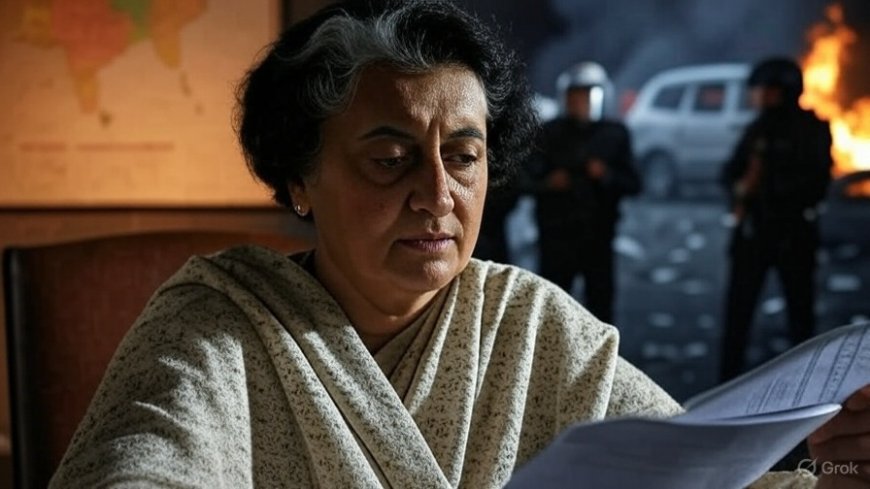Why Indira Gandhi Declared the 1975 Emergency: The Truth Behind India's Darkest Hour
Discover why Indira Gandhi declared the Emergency on June 25, 1975, and how it impacted Indian democracy. A deep dive into one of India’s darkest political periods.

On the midnight of June 25, 1975, India witnessed the dawn of one of the darkest chapters in its democratic history — the Emergency. Declared by then Prime Minister Indira Gandhi, it was a bold yet controversial decision that altered the nation's political and constitutional landscape. But why did she do it?
What Was the Emergency?
The Emergency, officially lasting from June 25, 1975, to March 21, 1977, was a 21-month period when civil liberties were suspended, press freedom was curtailed, opposition leaders were jailed, and the Constitution was amended to concentrate more power in the executive.
Indira Gandhi advised President Fakhruddin Ali Ahmed to invoke Article 352 of the Indian Constitution, citing “internal disturbance” as the reason — a vague term that allowed for sweeping control.
Why Did Indira Gandhi Declare the Emergency?
The reasons behind this unprecedented move were a combination of legal, political, and personal challenges:
1. The Allahabad High Court Verdict
On June 12, 1975, the Allahabad High Court found Indira Gandhi guilty of electoral malpractice during the 1971 Lok Sabha elections. The court invalidated her election and barred her from holding any elected office for six years. This was a severe blow to her political legitimacy.
She appealed the decision to the Supreme Court, which allowed her to remain Prime Minister but banned her from voting in Parliament until the case was resolved — creating a constitutional crisis.
2. The Growing Opposition Movement
A massive protest movement was growing across the country under the leadership of Jayaprakash Narayan (JP), a respected freedom fighter who called for total revolution. Students, labor unions, and political opponents rallied in cities demanding Indira’s resignation.
The anti-corruption wave had gained strength, and public sentiment was turning against the Congress government. There were nationwide strikes, and political instability loomed large.
3. Perceived Threats to National Stability
Indira Gandhi claimed that the opposition movement was destabilizing India and that external forces were conspiring with internal groups to bring down the government. In her address, she said, “The President has proclaimed Emergency. There is nothing to panic about.” However, her critics argue that the threat was manufactured or exaggerated to retain power.
What Happened During the Emergency?
-
Censorship: Press freedom was heavily restricted. Newspapers were subjected to pre-censorship, and publications critical of the government were shut down.
-
Mass Arrests: Over 100,000 people, including opposition leaders like Atal Bihari Vajpayee, L.K. Advani, and JP Narayan, were arrested under preventive detention laws.
-
Suspension of Civil Rights: Fundamental rights were suspended. Citizens couldn’t move courts for protection under Article 21 (Right to Life and Liberty).
-
Forced Sterilizations: Sanjay Gandhi, Indira's son, spearheaded a highly criticized forced sterilization campaign in the name of population control.
-
Constitutional Amendments: The 42nd Amendment, passed during the Emergency, curtailed the power of the judiciary and centralized more authority in the hands of the executive.
The End of Emergency and Its Aftermath
In January 1977, Indira Gandhi suddenly announced elections, likely confident of her return to power. However, in a stunning turn of events, the Janata Party, a coalition of opposition groups, defeated the Congress, and Morarji Desai became Prime Minister.
The verdict was a strong message from the people — democracy could not be taken for granted.
Why It Still Matters Today
The Emergency is a crucial lesson in constitutional ethics and political accountability. It showed how fragile democratic institutions can be when executive power goes unchecked. It also led to reforms that made future declarations of Emergency more difficult.
Though Indira Gandhi remains a towering figure in Indian politics, the Emergency remains a controversial and cautionary episode in her legacy.
Conclusion
Indira Gandhi declared the Emergency on June 25, 1975, largely to retain political power and suppress dissent following a court verdict and mass protests. While she claimed it was necessary for national stability, history views it as a dark period that endangered democracy in India.
It serves as a reminder that the vigilance of the public is the ultimate safeguard of freedom.














